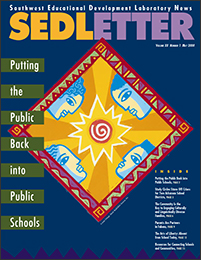Putting the Public Back into Public Schools
We aren't rallying around our schools. Instead of moving closer to the institutions, Americans are moving away....Erosion of our commitment to a system of public schools should be taken very seriously. —David Mathews
David Mathews, former Secretary of Health, Education, and Welfare and current CEO of the Kettering Foundation, is one of many concerned about the backlash against public schools. Based on ten years of research commissioned by the Kettering Foundation, Mathews writes, "Despite a long tradition of support for public education, Americans today seem to be halfway out the schoolhouse door."
He sees community building as one way to improve our schools. "It is not simply that the schools need to be improved; the relationship between the schools and the community needs repair," he notes. According to Mathews, "Strong communities, with people banded and pulling together, are our last line of defense against the breakdown of families and society. And they are also an essential source of ‘social capital’, a necessary form of reinforcement from outside the school that encourages children to learn."
SEDL has a history of helping communities become engaged with their schools. We have long stressed the importance of creating home, school, and community partnerships as a way to help ensure student success. This issue of SEDLetter looks at ways in which we can involve the public and ways in which citizens have made a difference in their communities and schools through SEDL field-based research projects.
One of our projects, Calling the Roll: Study Circles for Better Schools, focuses on deliberative dialogue as a process to engage state and local policymakers and the public. The article, "Study Circles Stave Off Crises for Two Arkansas School Districts" is a story of what happened in the communities of North Little Rock and Alread as a result of their involvement in the Calling the Roll project. The two communities faced very different crises, but the deliberative dialogue process helped both communities and their schools through tense situations.
"The Community is the Key to Engaging Culturally and Linguistically Diverse Families" discusses the importance and challenges of including culturally and linguistically diverse (CLD) families in community dialogue related to schools. These families are often left out of education discussions, yet their input and participation is needed to ensure their children’s needs are met.
"Parents Are Partners in Fabens" celebrates the successes of one of SEDL’s Collaborative Action Team (CAT) sites near El Paso, Texas. Like the deliberative dialogue process used in Calling the Roll, the CAT project provides a process that helps parents and community members of all backgrounds work together to provide the best education possible for their children. Instead of having a focus on policy making, the communities involved in CAT choose projects to help meet local and school needs such as providing health care services for their children, improving school facilities, and creating new learning opportunities for their children.
Finally, we present comments from Rutgers University professor Benjamin Barber who has devoted his career to the study of democracy. Barber, like Mathews, recognizes a great need for public engagement in our schools to ensure that every child in America receives a quality education. Barber spoke at a conference that SEDL cosponsored last fall as part of the Calling the Roll project. We think you will find his insights interesting with regard to the importance of public participation and the need to educate our children to become better citizens, to carry on the traditions, rights, and responsibilities of our diverse democracy.
Next Article: Study Circles Stave Off Crises for Two Arkansas School Districts

